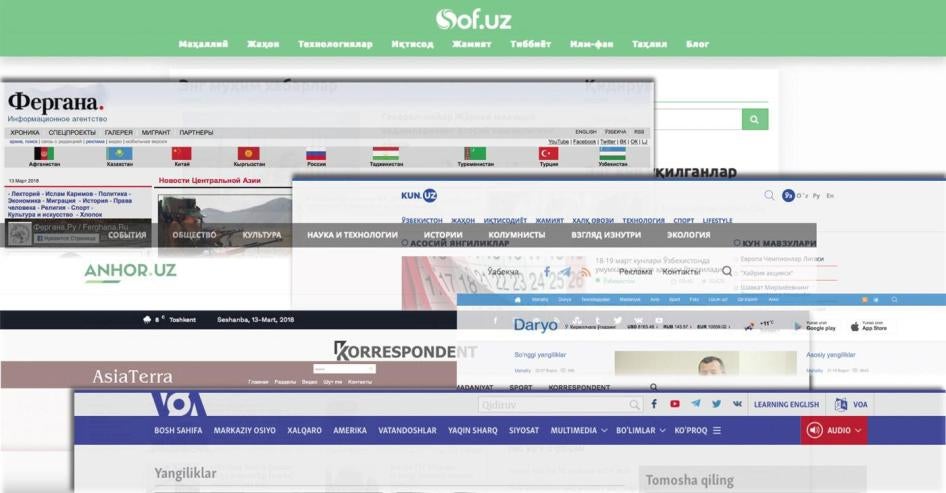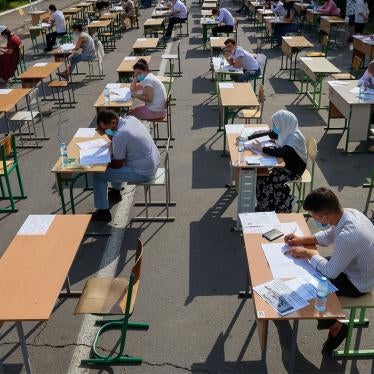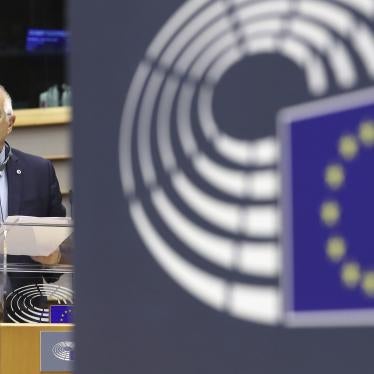CABAR.asia: Recently, the authorities of the Central Asian countries have been actively regulating online activities, adopting various laws that help them control the internet. How are things going with the freedom of the internet, with internet censorship in these countries?
First of all, the internet is a very positive development for the human rights movement in Central Asia and around the world. The authoritarian governments in Central Asia are partly cracking down on the internet because it is such a powerful way of organizing and sharing information. We’ve seen many examples of how the human rights movement has been enabled, given more power because of the power of sharing, influencing, organizing through the internet. Its worth holding on to this when we talk about restrictions on the net.
In some ways, you could see the crackdown on the internet as being a new frontier by governments to restrict activism in Central Asia. On the other hand, it’s not really very new. We should see this as a process, which has been going on for many years. Our friends in Freedom House, for instance, for many years have been monitoring the degree of internet freedom in the five Central Asian countries. All of them apart from Kyrgyzstan are completely ‘not free’. Internet freedom is extremely low, the restrictions are very tough. In Kyrgyzstan, it’s ‘partly free’. So the restrictions there are also quite significant.
Just in recent months, there have been several examples from Central Asian countries, which we maybe can talk about in more detail. We have the manipulation of information or the false information law in Kyrgyzstan that came into power in the summer. It is potentially very restrictive.
We have the proposals in the Kazakh parliament to require foreign media and messaging apps to register locally, which is a very significant piece of legislation that’s passed through the first reading. That will be potentially a significant vehicle for the Kazakh government to limit, to restrict the activities of Facebook and Google, and so on.
And then in Uzbekistan, the changes in the criminal code that were announced earlier this year, which criminalize online insult of the president. That applies to any text that is seen by authorities as insulting the president, even if its s a mild comment about politics in Uzbekistan.
So, we see the developments worsening, in the context of the internet being a very important vehicle for free speech and human rights organizing.
Previously, news, critical, opposition websites were mainly blocked in Central Asian countries. Has the situation changed now? Who is currently being targeted by censors?
There is still very widespread website blocking, as you know. In Turkmenistan, for instance, there is little if any access to international websites. In Tajikistan, there is widespread blocking of independent media, NGOs such as ourselves, and other international human rights organizations and opposition parties as well. The banned Islamic Renaissance party, for instance, their information is not available within Tajikistan. So, there is still widespread blocking of internet sites.
In terms of new targets, we need to remember that the spreading of false information, hate speech are all unfortunately widespread on the internet and those can also be used to target human rights activists.
I would highlight the threats to journalists through attacks on the internet, particularly women journalists. There’s been very widely recorded examples of women journalists in Central Asia being targeted through troll factories and through other forms of online harassment, which significantly impacts their work.
Bloggers, of course are another category. We’ve seen some examples this year in Uzbekistan of bloggers, whose job it is to spread information via the internet – such as a six and a half year prison sentence for Otabek Sattoriy a blogger in eastern Uzbekistan. Another blogger Miraziz Bazarov, who spoke out critically on public interest issues, including alleged corruption, was attacked in Tashkent and had to be hospitalized. When he was released he was arrested on criminal charges of slander. He is under house arrest. Targeting of bloggers is a widespread phenomenon in Central Asia.
The internet has no physical boundaries. If it is possible to somehow influence websites with a domestic domain, then how will the authorities of the Central Asian countries be able to control the content that comes from abroad? For example, a Facebook post or an Instagram page.
That’s a really important aspect, and that’s why, I would highlight here this development in Kazakhstan The Kazakh authorities are demanding foreign social media organizations to have a local presence – a local registered office. And by doing that, they have more opportunity to require those companies say Google or Facebook to take down comments or posts they see as politically problematic. So, they’re trying to increase their influence over such companies by passing this legislation. We find that extremely worrying because it sets a trend whereby these companies will be more under the influence of authorities such as in Kazakhstan.
We’ve seen this example elsewhere, by the way, not in Central Asia so much, but in other countries, for instance, in Turkey. A similar law was adopted and most of the social media companies have actually set up registered offices. And there’s a real danger that that will lead to more pressure of authorities on whether those companies allow posts to stay up, even if they’re critical of the authorities.
Another way of dealing with foreign content coming into countries is of course throttling the internet – technically limiting how much capacity internet providers have and how much access users can have to the internet. That happens also in Kazakhstan and elsewhere in the region. People simply cannot load pages or download videos and that’s a very common technical method to limit access to online information.
It is one thing to pass laws, and another to implement them. What technical potential do the countries of the region have in the struggle to control the internet? Besides the banal blocking of websites, are there any more advanced control mechanisms?
There are a couple of examples. I’ve mentioned the almost complete limits on the internet in Turkmenistan. One trend, which has been going on for some time is the strong crackdown in Turkmenistan on the use of VPNs, virtual private networks – devices to access the internet outside the country. We’ve seen just this year examples of teachers being fined because pupils in their classes were downloading and allegedly using VPNs. And young people have had their mobiles confiscated for allegedly accessing the internet.
Another example is from Kyrgyzstan the false information law. That law has been passed now. But it’s unclear to what extent Kyrgyz authorities can implement it. This would need quite significant authority and resources to monitor the internet and give instructions to social media providers to take down pages and so on. However, it remains a sword hanging over the heads of many users or activists in Kyrgyzstan as they may fear that they will become victims of this law. We need more clarity about how the government will implement this law and NGOs and experts need to be consulted to help protect human rights as far as absolutely possible.
Tightening control over the internet is often compared to control over freedom of speech. The internet can be a platform for constructive criticism and groundless insults, hostility, and fake stuffing. Where is the line between the right to freedom of expression and responsibility for what is said on the internet?
That’s also a really good question, which not only applies to Central Asia but applies all around the world. The internet is like the market square, a public space – people should be allowed to say their views, they should be able to voice non-violent criticism of politicians and the authorities without fear of being persecuted for doing so. That applies in the market square and it applies on the internet. There need to be some limits on this and under international human rights law, those limits are for instance, where those comments are a direct appeal to violence. That is one obvious limit, which should be imposed in the market square and on the internet. Central Asian governments need to be guided by such international human rights standards.
Now there have been many attempts around the world to try to find this balance between free speech and controlling hate speech. It’s important to note that challenges of this kind exist in many places, not just in Central Asia. We’ve been critical of what’s been happening in other much more developed western states, for instance, in Germany. Germany a few years ago passed a new law, which tries to find this balance between free speech and controlling hate speech. It’s called the NetzDG law. Unfortunately, we see this law in effect privatizing the decisions about what is on the wrong side of this line, what constitutes hate speech, leaving these decisions to companies like Facebook and Google, and giving users no judicial oversight or right to appeal when content is removed. Unfortunately, things like this law and other laws by other Western governments are being copied by countries around the world. We’ve seen that in Turkey and elsewhere.
So, it’s not just in Central Asia, but elsewhere that governments need to get this right and we would encourage governments in Central Asia to learn from best practices on these issues in finding the right balance between these things.
What do you think needs to be done to improve the current situation for internet users in Central Asia? What would you recommend for the authorities and the citizens themselves?
As I said at the beginning, the internet can reinforce citizens’ needs to share their opinions, to organize among themselves, to take part in society and community.
I would encourage authorities to recognize that the internet and freedom of speech on the internet is a part of the fundamental freedoms which they are committed to protecting. Each of the Central Asian states is on paper committed to free speech. So, they should apply international human rights standards to allow free speech and freedom of organizing on internet platforms.
There should be support for quality journalism. We haven’t spoken so much about the dangers of fake news on the internet, but that is a real danger and that’s why troll factories and similar things are so worrying. So, governments and media organisations need to invest in promoting the training of journalists, the promotion of high journalistic standards. Also, steps are needed to ensure women journalists there are not harassed and intimidated and bullied online.
We need to support groups and institutions that promote these values in Central Asian countries and elsewhere, such as media freedom NGOs For instance, the OSCE representative on the freedom of the media focuses quite a lot on the Central Asia area. It’s good to work with this and similar bodies such as from the UN that can also be helpful for governments to learn and to share best practices.









